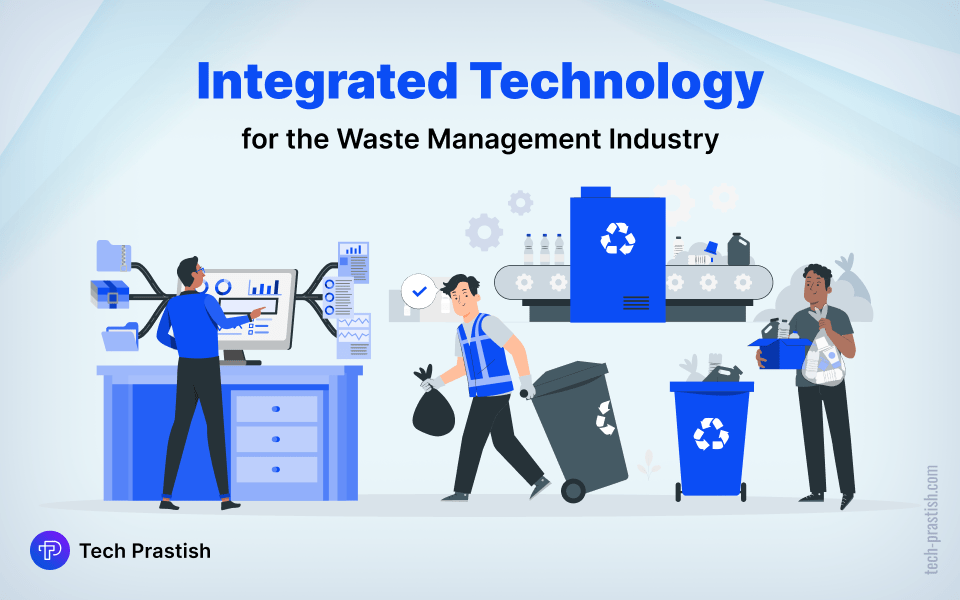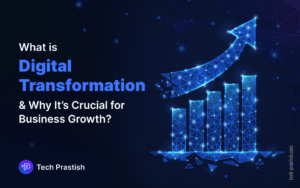
The growing population and urbanization directly drive an increase in waste generation, creating significant environmental challenges and health risks. In this scenario, it is important to recognize the importance of investing in integrated waste management solutions to address these issues effectively.
Businesses aiming to optimize operations, reduce costs, and showcase environmental responsibility have consistently focused on the waste management industry. However, traditional approaches often fall short of addressing the entire waste process, from generation to disposal. To effectively manage waste in an eco-friendly and efficient manner, an integrated waste management system is essential.
Incorporating modern technology into waste management not only enhances operational efficiency but also aligns businesses with sustainability goals, environmental regulations, and the circular economy.
Let’s explore how integrated technology is transforming the waste management industry.
What Is An Integrated Waste Management Technology?
An integrated waste management technology is a comprehensive approach to waste management that combines technology, science, and regulatory compliance to handle the entire waste process — from waste generation to disposal. Unlike traditional, fragmented methods, waste management industry emphasizes sustainability, efficiency, and cost-effectiveness. It also supports businesses in reducing their environmental footprint by treating waste as a resource rather than a problem, thereby creating a circular economy. To imply the problem-specific solution for waste management by analyzing the region, population, waste type, waste volume, environmental impact, and many other key points that are important to understand the waste management life cycle thoroughly.
The Waste Management Life-Cycle
The waste management lifecycle refers to the stages involved in managing waste from its creation to its final disposal, recycling, or recovery. This systematic approach ensures that waste is handled responsibly, minimizing its negative environmental impact. Here’s a closer look at each key stage in the lifecycle:
1. Waste Generation:
Creating waste from households, businesses, and industries.
2. Waste Collection:
Gathering and preparing waste from various sources for further processing.
3. Waste Sorting and Segregation:
Separating recyclable materials, hazardous waste, and organic waste.
4. Waste Processing:
-
-
- Recycling: Turning waste materials into reusable resources.
- Composting: Organic waste breaks down into compost for agricultural use.
- Waste-to-Energy (WTE): Converting non-recyclable waste into usable energy (heat or electricity).
- Mechanical and Biological Treatment (MBT): Combining mechanical sorting and biological processes for waste treatment.
-
5. Waste Disposal:
-
-
- Landfilling: Burying non-recyclable waste in designated landfill sites.
- Incineration: Burning waste reduces its volume and generates energy.
- Deep-Well Injection: Storing hazardous waste deep underground.
-
6. Waste Monitoring and Compliance:
Ensuring adherence to environmental regulations.
7. Waste Recovery and Reuse:
Reclaiming valuable resources or energy from waste.
8. Environmental Impact Assessment:
Evaluating the effects of waste management practices on the environment.
The system encompasses a broad spectrum of waste management activities such as generation, segregation, transfer, sorting, treatment, recovery, and disposal while maximizing the efficiency of resource use. With integrated solutions, businesses can reduce waste, improve recycling rates, and even harness energy from waste, contributing to the transition towards a circular economy.
The Urgency of Adopting the Integrated Technologies for Waste Management
As environmental concerns grow and regulations tighten, companies have stronger reasons than ever to adopt integrated waste management technologies. The urgency of adopting integrated technologies in waste management stems from the growing environmental challenges, rising waste generation, and the need for more efficient, sustainable solutions. Traditional methods are increasingly inadequate in handling the complexity and scale of modern waste streams. Integrated waste management technologies like ERP, AI, IoT, and API systems offer real-time data, automation, and better resource management, enabling waste management companies to reduce costs, improve efficiency, ensure regulatory compliance, and minimize environmental impact. With the global push for sustainability, adopting these technologies is critical to meeting the demands of the circular economy and addressing climate change. It ensures compliance with environmental regulations and responds to the increasing public demand for sustainable business practices.
Key Technologies in Waste Management
Technology plays a crucial role in improving the efficiency, effectiveness, and sustainability of waste management operations. Various technological advancements are reshaping the industry, from waste reduction to smart collection systems, advanced recycling techniques, and real-time data monitoring.
Below are some of the critical technologies used in integrated waste management:
1. Business Consulting Services
Business consulting services assist waste management companies in improving their operational performance and sustainability. Consultants can help businesses adopt best practices, optimize workflows, reduce costs, and ensure regulatory compliance.
Key Benefits:
- Operational Efficiency: Identifies areas for improvement, such as reducing fuel consumption or automating waste sorting.
- Sustainability Initiatives: Develop strategies for minimizing waste generation and promoting recycling.
- Regulatory Compliance: Ensure safe operations in compliance with environmental regulations at all levels.
- Market Expansion: Advises on new market entry strategies and customer segmentation.
- Technology Adoption: Helps integrate emerging technologies like ERP, CRM, and IoT for enhanced operations.
2. Enterprise Resource Planning (ERP) in Waste Management
Enterprise Resource Planning (ERP) is a software system that can help waste management companies streamline and automate business processes by integrating various business functions into a single platform. ERP solutions help streamline operations in waste management by automating and optimizing critical processes like waste collection, recycling, billing, and inventory management.
Key Benefits:
- Route Optimization: Efficiently tracks waste collection schedules, optimizes collection routes, and manages fleets.
- Inventory Control: Monitors recyclable materials and optimizes storage and processing.
- Automated Billing: Simplifies invoicing, tracking payments, and managing financials.
- Data-Driven Insights: Consolidates operational data for better decision-making.
3. Customer Relationship Management (CRM) in Waste Management
CRM systems manage customer interactions and improve communication, leading to better service delivery and customer satisfaction. Waste management companies can use CRM platforms to track service requests, complaints, and client feedback.
Key Benefits:
- Customer Segmentation: Classifies customers based on service type, location, and usage patterns.
- Automated Service Alerts: Sends reminders about collection schedules, billing, and updates.
- Feedback Systems: Collects and analyzes customer feedback to improve services.
- Personalized Engagement: Enhances customer service by tailoring communication and offering solutions.
4. API Integration Services for Seamless Data Flow
API (Application Programming Interface) integration allows different platforms and applications to exchange data seamlessly. In waste management, APIs enable real-time data exchange between various systems, improving operational efficiency and decision-making.
Key Benefits:
- Fleet Management: Integrates GPS and route optimization systems to track truck locations and optimize collection routes.
- Smart Bins: Integrates IoT-enabled smart waste bins that monitor fill levels and optimize collection schedules.
- Payment Systems: Facilitates easy, online billing and payment processing through integrated payment gateways.
- Real-Time Data Exchange: Allows for efficient coordination between waste management software, recycling centers, and energy plants.
5. Smart Waste Collection and Management
Internet of Things (IoT) sensors, AI-powered route optimization, and GPS-enabled trucks are revolutionizing waste collection. Smart bins equipped with sensors can automatically notify waste management companies when they are full, and AI-based systems can optimize collection routes based on traffic conditions and bin fill levels, reducing fuel consumption and operational costs.
Key Benefits:
- Real-Time Monitoring: IoT sensors enable real-time monitoring of waste bin fill levels, improving collection efficiency.
- Route Optimization: Technology-driven algorithms reduce unnecessary collection trips and ensure more efficient waste collection routes.
- Reduced Carbon Footprint: More efficient collection leads to fewer emissions and a smaller environmental impact.
6. Recycling Technologies
Advancements in recycling technologies, such as automated sorting systems, and chemical recycling, are making it easier to reclaim valuable materials from waste streams. These innovations are increasing recycling rates and diverting waste from landfills.
Key Benefits:
- Automated Sorting: Advanced systems like optical sorters and AI algorithms can identify and separate recyclable materials faster and more accurately than manual methods.
- Plastic Recycling Innovations: Chemical recycling breaks down plastics into their original components for reuse, tackling the challenge of contaminated plastics.
- Energy from Waste: Technologies like Waste-to-Energy (WTE) convert non-recyclable materials into usable energy, contributing to the circular economy.
7. Waste Monitoring and Compliance
RFID (Radio Frequency Identification) technologies are transforming how waste management companies track and report on waste disposal and recycling activities. These technologies create transparent, traceable records, ensuring compliance with environmental regulations and reducing fraud.
Key Benefits:
- Transparency: Data-driven technologies ensure that waste management data is transparent and traceable, from generation to disposal.
- Efficiency: RFID tags track waste bins and trucks in real-time, improving waste collection processes and compliance monitoring.
- Predictive Analytics: AI and data analytics can forecast waste generation patterns, enabling better resource allocation and operational planning.
The Future of Waste Management
As the world is struggling with growing waste and environmental challenges, integrated technology offers a pathway to smarter, more sustainable waste management practices. By leveraging technologies like AI, IoT, ERP, CRM, and API integration services, waste management companies can improve operational efficiency, enhance customer satisfaction, ensure regulatory compliance, and promote environmental sustainability.
By embracing integrated technologies, the waste management industry is poised for a revolution that not only optimizes operations but also contributes significantly to global sustainability goals.
As we bring together SaaS innovation and strategic acquisitions to strengthen waste management by providing integrated waste management software solutions for the waste management industry. Tech Prastish can help you transform waste from a problem into a resource, enabling businesses to contribute to the circular economy and reduce their environmental footprint. The continuous development and integration of new technologies will be key to solving global waste challenges and achieving a more sustainable future for all. To know more about our integrated waste management software solutions contact us now!





